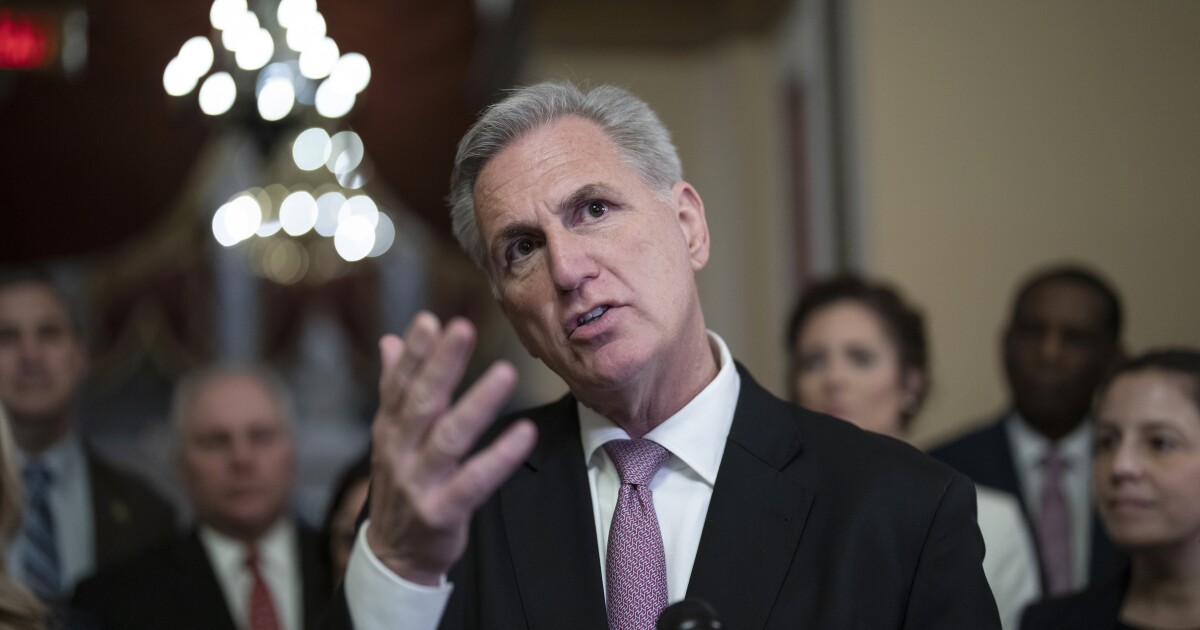

House Republicans are gearing up next week to debate and vote on HR 1, the Lower Energy Costs Act, legislation meant to counter President Joe Biden’s energy agenda and increase domestic production.
The 175-page bill will be the first major product to come from multiple Republican-led committees since the party regained control of the House in the November 2022 midterm elections.
DAILY ON ENERGY: OIL’S IN RANGE, BUT GRANHOLM IS NOT OPTIMISTIC ABOUT REFILLING SPR
Republicans have touted their collective action on HR 1, which combines major priorities and efforts advanced by the House Energy and Commerce Committee, the House Natural Resources and Transportation Committee, and the House Transportation and Infrastructure Committee.
House GOP conference leaders said it increases U.S. energy independence by boosting domestic production, reforming the permitting process to allow the construction of major projects, streamlining energy infrastructure and exports, and boosting the production and processing of critical minerals.
“This bill counters President Biden’s attack on our domestic energy and includes permitting reforms that will speed construction for major infrastructure projects across the country,” House Speaker Kevin McCarthy (R-CA) said in a statement.
Still, challenges loom.
With just a four-seat majority in the chamber, Republicans could find themselves stymied on certain issues, such as whether to take up certain controversial amendments, including a provision that would approve the nearly 300-mile Mountain Valley natural gas pipeline for completion, aiding in the delivery of as much as 200 billion cubic feet of gas per day from Pennsylvania, Ohio, and West Virginia to North Carolina and South Carolina.
But the path for HR 1 is much rockier in the Senate, where Majority Leader Chuck Schumer (D-NY) has already described the bill as “dead on arrival” due to its massive allowances for fossil fuel producers.
Here’s a look at some of the main priorities included in the legislation:
STREAMLINING THE PERMITTING PROCESS
HR 1 contains key provisions aimed at streamlining and accelerating the federal permitting process under the National Environmental Policy Act, or NEPA, the bedrock environmental law many say makes it too hard to approve and build projects.
The provisions seek to speed up permitting for domestic energy infrastructure and would develop a more uniform and transparent process for the construction, operation, and maintenance of international border-crossing facilities, such as oil and natural gas pipelines, according to the text of the bill. It would also greenlight more energy development on federal lands.
It would authorize the Federal Energy Regulatory Commission, or FERC, to review applications for cross-border oil and natural gas pipelines and the Department of Energy to review applications for cross-border electricity transmission facilities.
The bill would also cap the amount of time the federal government has to conduct environmental impact statements, setting a two-year review period for major energy projects and a one-year period for projects warranting less rigorous review.
Permitting reform has been a priority for lawmakers in both parties, and it is considered a key area for bipartisanship this congressional session.
Sen. Joe Manchin (D-WV) tried and failed to pass multiple versions of his permitting reform legislation last year, including reintroducing it as an amendment to the National Defense Authorization Act in December, where it ultimately failed.
Schumer had agreed to support Manchin’s legislation last August in exchange for his “yes” vote on the Inflation Reduction Act.
The Biden administration has also signaled its support for permitting reform, backing Manchin’s efforts.
PERMITTING FOR CRITICAL MINERALS MINING
A separate portion of the bill seeks to streamline and accelerate the federal permitting process for critical minerals mining and production.
The bill would direct the energy secretary to strengthen U.S. critical minerals sourcing and to increase domestic production, refining, and processing of these materials — processes often outsourced to other countries.
This is a critical step for helping reshore electric vehicle battery production and other clean energy production, all goals outlined in the Biden administration’s Inflation Reduction Act.
It would also authorize the Environmental Protection Agency administrator to waive applications of certain requirements for processing and refining of critical energy materials.
It would also amend existing criteria to potentially allow uranium to be designated as a critical mineral. Uranium had been declared as a critical mineral by the Trump administration but was later removed from the list by the Biden administration, noting that since it is considered a “fuel mineral,” it is ineligible.
FOSSIL FUEL PRODUCTION
The bill includes several provisions aimed at boosting domestic oil and gas production and boosting exports of liquefied natural gas.
Biden campaigned on restricting or ending altogether parts of the federal oil and gas leasing program in a bid to drive down pollution. And during his first week in office, he signed an executive order suspending new lease sales, though it was later blocked by a federal judge. Furthermore, the Inflation Reduction Act included, at Manchin’s insistence, provisions meant to spur new sales.
The administration is not issuing leases anywhere near the scale Republicans favor, though. And the Bureau of Land Management has raised rents and royalties for lessees.
One section would require the Department of the Interior to “immediately” resume quarterly lease sales on federal lands at a rate of a minimum of four lease sales per year in each onshore state with eligible lands.
It also requires the interior secretary to issue the five-year oil and gas leasing program for 2023-2028 and begin preparation on the subsequent leasing program “no later” than 36 months after conducting the first sale in a bid to avoid a lapse in offshore activity.
It would also streamline the construction and operation of cross-border energy infrastructure, such as the Keystone XL pipeline.
Other provisions would end the federal moratorium on new coal leasing, prohibit any pause on fracking in the United States, and repeal a methane fee provision passed under Biden that would charge large fossil fuel companies for excess methane emissions.
CLICK HERE TO READ MORE FROM THE WASHINGTON EXAMINER
It would also repeal all restrictions on imports and exports of natural gas, including by allowing the U.S. to sell LNG to countries with which it does not have a free trade agreement.
“We want to lift barriers to expanding our energy supplies, remove red tape over exportation and importation of LNG, and build more pipelines with our North American allies and across the states,” said House Energy and Commerce Chairwoman Cathy McMorris Rodgers (R-WA), who helped introduce more than 20 pieces of legislation into the final bill.




